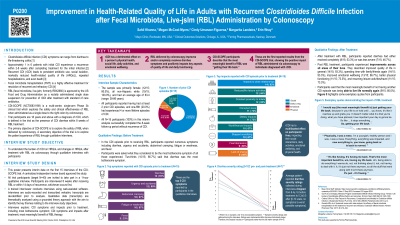Sunday Poster Session
Category: Colon
P0200 - Improvement in Health-Related Quality of Life in Adults with Recurrent Clostridioides difficile Infection After Fecal Microbiota, Live-jslm (RBX2660) Administration by Colonoscopy
Sunday, October 27, 2024
3:30 PM - 7:00 PM ET
Location: Exhibit Hall E

Has Audio

Sahil Khanna, MBBS, MS
Mayo Clinic
Rochester, MN
Presenting Author(s)
Sahil Khanna, MBBS, MS1, Megan McCool-Myers, PhD, MPH2, Cindy Umanzor Figueroa, MPH2, Margarita Landeira, MSc3, Erin Wray, 3
1Mayo Clinic, Rochester, MN; 2Clinical Outcomes Solutions, Chicago, IL; 3Ferring Pharmaceuticals, Kastrup, Hovedstaden, Denmark
Introduction: Approximately 1 in 6 patients diagnosed with Clostridioides difficile infection (CDI) experience a recurrence within 2-8 weeks after completing treatment for initial infection. Recurrent CDI (rCDI) leads to persistent use of antibiotics, markedly reduced health-related quality of life (HRQoL), repeated hospitalizations, and death. CDI-SCOPE is a multi-center, single-arm Phase 3b clinical trial exploring the safety and clinical effectiveness of RBX2660, an FDA-approved microbiota suspension, administered by colonoscopy to adults with rCDI.
Methods: All trial participants (target N=40) are invited to take part in a 1-hour interview exploring the burden of rCDI on HRQoL and any positive improvements in HRQoL after treatment. Participants are interviewed 8 weeks after receiving RBX2660 or within 14 days of recurrence – whichever occurs first. A trained interviewer conducts interviews using web-assisted software. Audio recordings are transcribed verbatim and de-identified prior to analysis. A centralized independent review board approved the study.
Results: Data on n=15 interview participants are presented in this interim analysis (participant characteristics in Table 1). All 15 participants (100.0%) completed the 8-week follow-up; none experienced recurrence. Before receiving RBX2660, most reported diarrhea as the most bothersome (66.7%) and the most important symptom (70.0%) to resolve. Participants reported that CDI impacted their day-to-day life (need proximity to bathroom: 80.0%; impacted leisure time: 80.0%; disrupted sleep: 73.3%; ability to eat nutritious meals: 73.3%), affected mental health (fear rCDI would not resolve: 60.0%), and led to debilitating fatigue (60.0%). Post RBX2660 treatment, participants reported diarrhea had either resolved completely (53.3%) or was less severe (46.7%). Average patient-reported diarrhea severity ratings [0-10, no symptoms to worst possible symptoms] dropped from 8.4 (SD: 1.6) before treatment to 0.3 (SD: 0.5) after. Participants described HRQoL improvements (improved physical function: 73.3%: ability to spend time with family again: 73.3%; able to return to leisure activities: 66.7%; feeling better mentally: 66.7%).
Discussion: This interim analysis suggests RBX2660 treatment improves and/or completely resolves diarrhea symptoms and positively impacts key aspects of HRQoL and daily functioning.
Note: The table for this abstract can be viewed in the ePoster Gallery section of the ACG 2024 ePoster Site or in The American Journal of Gastroenterology's abstract supplement issue, both of which will be available starting October 27, 2024.
Disclosures:
Sahil Khanna, MBBS, MS1, Megan McCool-Myers, PhD, MPH2, Cindy Umanzor Figueroa, MPH2, Margarita Landeira, MSc3, Erin Wray, 3. P0200 - Improvement in Health-Related Quality of Life in Adults with Recurrent <i>Clostridioides difficile</i> Infection After Fecal Microbiota, Live-jslm (RBX2660) Administration by Colonoscopy, ACG 2024 Annual Scientific Meeting Abstracts. Philadelphia, PA: American College of Gastroenterology.
1Mayo Clinic, Rochester, MN; 2Clinical Outcomes Solutions, Chicago, IL; 3Ferring Pharmaceuticals, Kastrup, Hovedstaden, Denmark
Introduction: Approximately 1 in 6 patients diagnosed with Clostridioides difficile infection (CDI) experience a recurrence within 2-8 weeks after completing treatment for initial infection. Recurrent CDI (rCDI) leads to persistent use of antibiotics, markedly reduced health-related quality of life (HRQoL), repeated hospitalizations, and death. CDI-SCOPE is a multi-center, single-arm Phase 3b clinical trial exploring the safety and clinical effectiveness of RBX2660, an FDA-approved microbiota suspension, administered by colonoscopy to adults with rCDI.
Methods: All trial participants (target N=40) are invited to take part in a 1-hour interview exploring the burden of rCDI on HRQoL and any positive improvements in HRQoL after treatment. Participants are interviewed 8 weeks after receiving RBX2660 or within 14 days of recurrence – whichever occurs first. A trained interviewer conducts interviews using web-assisted software. Audio recordings are transcribed verbatim and de-identified prior to analysis. A centralized independent review board approved the study.
Results: Data on n=15 interview participants are presented in this interim analysis (participant characteristics in Table 1). All 15 participants (100.0%) completed the 8-week follow-up; none experienced recurrence. Before receiving RBX2660, most reported diarrhea as the most bothersome (66.7%) and the most important symptom (70.0%) to resolve. Participants reported that CDI impacted their day-to-day life (need proximity to bathroom: 80.0%; impacted leisure time: 80.0%; disrupted sleep: 73.3%; ability to eat nutritious meals: 73.3%), affected mental health (fear rCDI would not resolve: 60.0%), and led to debilitating fatigue (60.0%). Post RBX2660 treatment, participants reported diarrhea had either resolved completely (53.3%) or was less severe (46.7%). Average patient-reported diarrhea severity ratings [0-10, no symptoms to worst possible symptoms] dropped from 8.4 (SD: 1.6) before treatment to 0.3 (SD: 0.5) after. Participants described HRQoL improvements (improved physical function: 73.3%: ability to spend time with family again: 73.3%; able to return to leisure activities: 66.7%; feeling better mentally: 66.7%).
Discussion: This interim analysis suggests RBX2660 treatment improves and/or completely resolves diarrhea symptoms and positively impacts key aspects of HRQoL and daily functioning.
Note: The table for this abstract can be viewed in the ePoster Gallery section of the ACG 2024 ePoster Site or in The American Journal of Gastroenterology's abstract supplement issue, both of which will be available starting October 27, 2024.
Disclosures:
Sahil Khanna: Ferring Pharmaceuticals, Inc. – Grant/Research Support. Finch – Grant/Research Support. Pfizer – Grant/Research Support. Probio Tech, LLC – Consultant. Rise – Consultant. Seres Therapeutics – Grant/Research Support. Takeda – Consultant. Vedanta – Grant/Research Support.
Megan McCool-Myers: Ferring Pharmaceuticals Inc – Consultant.
Cindy Umanzor Figueroa: Ferring Pharmaceuticals Inc – Consultant.
Margarita Landeira: Ferring Pharmaceuticals Inc – Employee.
Erin Wray: Ferring Pharmaceuticals Inc – Employee.
Sahil Khanna, MBBS, MS1, Megan McCool-Myers, PhD, MPH2, Cindy Umanzor Figueroa, MPH2, Margarita Landeira, MSc3, Erin Wray, 3. P0200 - Improvement in Health-Related Quality of Life in Adults with Recurrent <i>Clostridioides difficile</i> Infection After Fecal Microbiota, Live-jslm (RBX2660) Administration by Colonoscopy, ACG 2024 Annual Scientific Meeting Abstracts. Philadelphia, PA: American College of Gastroenterology.

